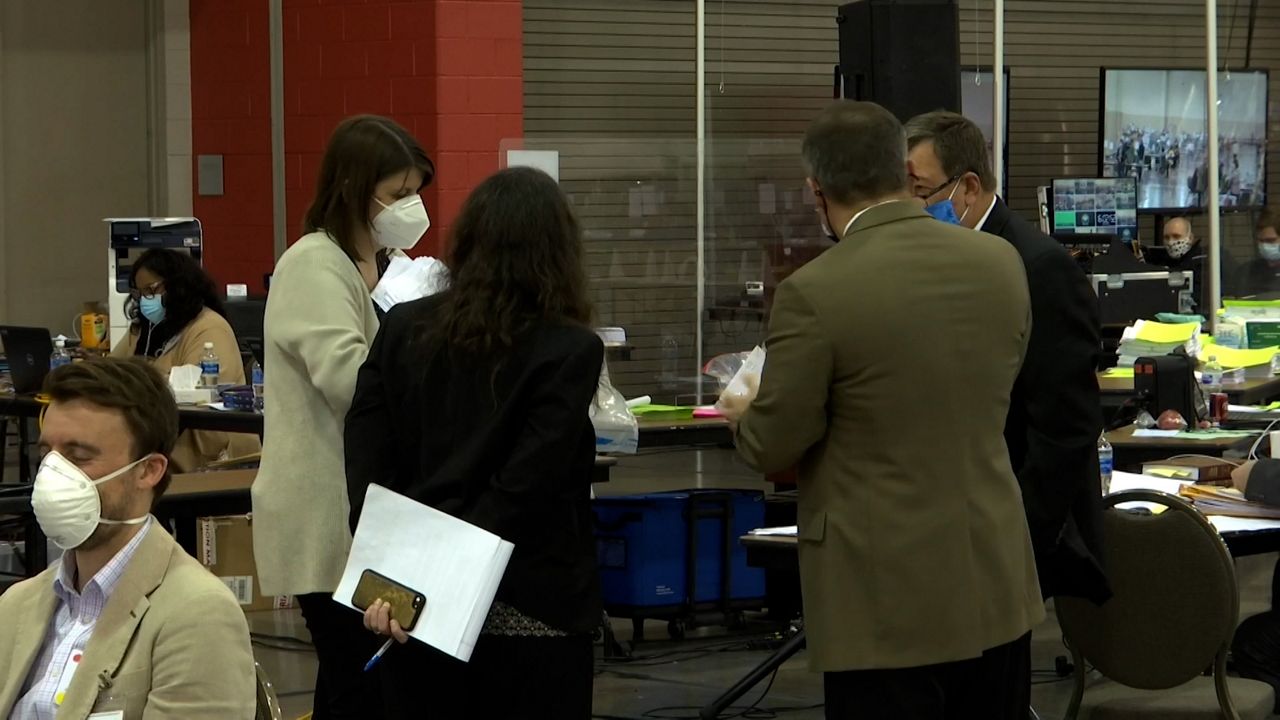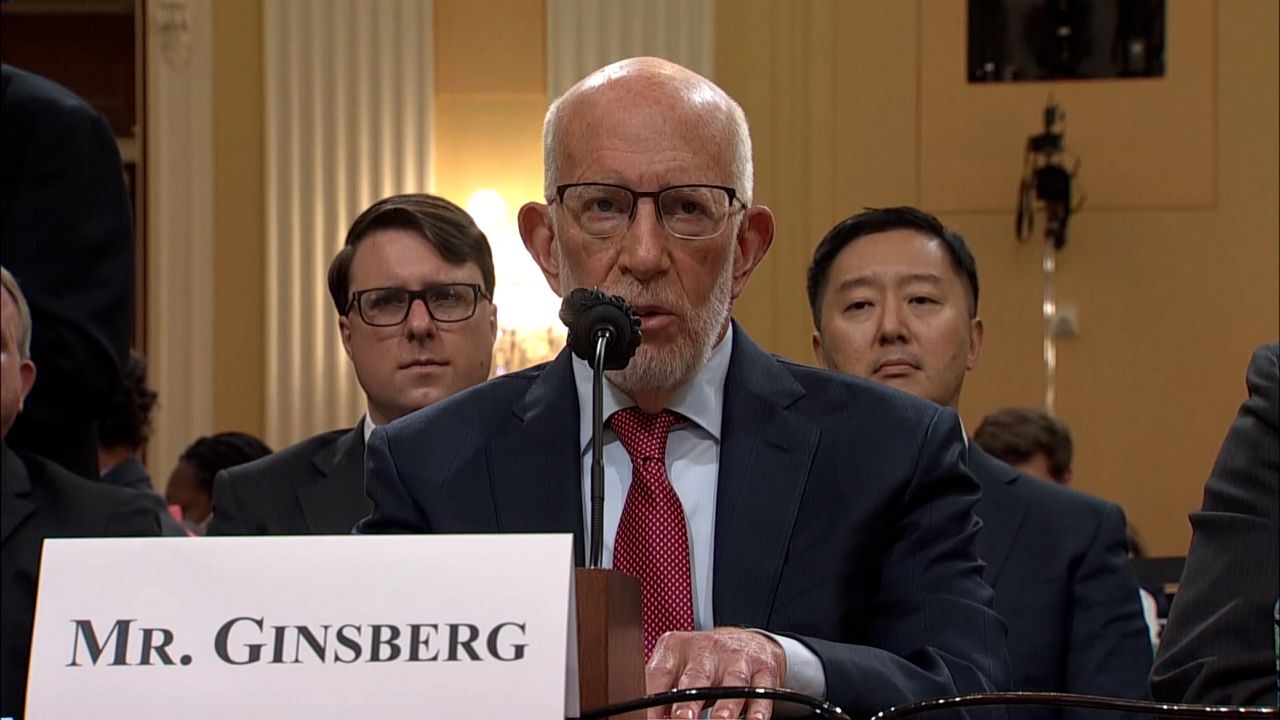The threats to Claire Woodall-Vogg, the top election official in Milwaukee, began soon after the 2020 election ended. They came by voice mail and email, almost always anonymously.
“I really sincerely hope you get what’s coming to you.”.
“We’re going to hang you.”
“We’re coming for you, Claire.”
“It made me feel very angry,” Woodall-Vogg says now. “I don’t think that I took on receiving death threats as someone who administers elections.”
More than a year and a half after the polls closed, the aftershocks of the 2020 election continue, even after numerous courts, recounts and audits affirmed Biden’s victory.

Among those affected are the people who count the vote. Some have been worried about losing their lives.
Woodall-Vogg traces the threats against her to a lighthearted email exchange at the end of a very long Election Day.
About 3 a.m., Nov. 4, 2020, after Woodall-Vogg announced Milwaukee’s final vote - a tally that put Biden over the top in Wisconsin - a consultant sent her an email. It jokingly questioned if she purposely delayed releasing results showing Joe Biden’s victory until the middle of the night for dramatic effect.
“And I replied ‘lol,’ implying that I knew it was a joke,” she said in an interview with Spectrum News. “I said, ‘I actually just wanted to say that I had been awake for twenty-four hours.’”
A conservative website got hold of the exchange and published it, to support bogus claims of election rigging in swing states like Wisconsin, claiming they were meant to benefit Biden over Republican Donald Trump.
The threats became so bad, Woodall-Vogg temporarily left the state with her two small children.
The House Select Committee is explaining how President Donald Trump tried to undermine the 2020 results by pushing debunked conspiracy theories of widespread fraud in the vote. The committee is arguing that his persistent accounts of a stolen election is undermining confidence in democracy. Some say it also may have violated federal law.
Trump, for his part, continues to argue — falsely — that widespread fraud in the swing tilted the election to Democrats — claims that no court or audit has found legitimate.
One under-examined effect of Trump’s falsehoods is its effect on election officials — especially in swing states. Reporting accurate results of Trump’s loss led to their names being publicized, which led to threats unleashed against them and their families, as happened to Woodall-Vogg.
“After the president tweeted at me by name, calling me out the way that he did, the threats became much more specific, much more graphic,” Al Schmidt, a former Philadelphia city commissioner who oversaw that city’s election as the sole Republican on its election board, said at a Jan. 6 panel hearing on Monday.
“Not just me by name, but included members of my family, by name. Their ages, our address, pictures of our home — just every bit of detail that you can imagine.”
Exact numbers aren’t available, but numerous election officials across the country say they’ve been threatened or treated with suspicion —and it’s leading to burnout. A recent report found that one in six local election officials have experienced threats; one in five are “very” or “somewhat unlikely” to remain in their posts through 2024.
The stress is seen as particularly bad in the battleground states like Wisconsin that decided the 2020 election.
“They don’t want the stress,” said Sara Bruckman, deputy clerk of the Milwaukee suburb Fox Point who is president of the Wisconsin Municipal Clerks Association.
“It’d be like if you were a doctor and somebody was questioning everything you did all the time. You know that this is your practice, this is what you do.”
Bruckman says while the last presidential election unleashed a torrent of threats, mistrust among Wisconsin voters began bubbling up months before, during the April 2020 primary.
COVID, then in its early days, was shuttering voting sites. The state scrambled to expand mail-in voting — but in the White House, then-President Trump was preaching distrust in the system, ignoring the safeguards.
Then, voters in the town of Fox Point assumed the worst when they didn’t immediately see records that they had voted on an official website. It was actually a normal processing delay.
“They just were like, 'how could you throw away my vote?'” Bruckman said, recalling that she was told she should “die.”
She stresses that their votes were ultimately counted — and said she has complete confidence in the final tallies of the statewide presidential election.
“It’s heart wrenching because they trusted you for so long. And all of a sudden, that trust, for no reason, is gone.”
Much of that trust has not returned. A long-term investigation ordered by the Wisconsin State Assembly failed to turn up extensive voter fraud, yet political figures continue to insist the 2020 election was tainted.
“Wisconsin in many ways has gone the furthest,” said Paul Nolette, a political science professor at Marquette University. “I think ultimately it’s Donald Trump who’s staying active, who the Republican base is still taking a number of cues from.” Indeed, a recent Washington Post investigation shows that scores of Republicans won primaries after repeating Trump’s falsehoods.
A Trump spokesperson didn’t immediately return an email seeking comment.
But some Republicans are pushing back — including the party’s best known election lawyer, Ben Ginsberg.
“The 2020 election was not close,” he said at a recent hearing of the Jan. 6 commission.

“If Republicans actually do get elected to office, they face the real risk of backlash coming back that their elections weren’t legitimate,” he added in an interview.
Ginsberg, who helped George W. Bush win the White House in 2000 after a disputed race against Al Gore, now says his concern about democracy is so deep that he’s teaming up with Democrats. He and President Obama’s former White House Counsel are offering free legal support to any U-S election official who feels threatened.
“It is not tenable to have 30 percent of the population doubting elections,” he said. “Democracies do not survive in that situation.”
He says restoring trust in democracy starts with greater understanding of the election process.
And that is exactly what Woodall-Vogg says she’s been doing since the fall of 2020: educating voters on how elections work.
Still, she continues to get threats — and she’s taking measures to ensure her staff stays safe, including implementing tighter security at Milwaukee’s Election Commission.
But she says she has no plans to quit.
“We have to keep standing up,” she said. “I think that our democracy is worth fighting for and worth saving, and that means you have to be involved.”



